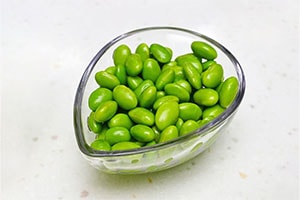
Fun Fact
According to the National Soybean Research Laboratory (NSRL), there are over 2,500 varieties of soybeans currently under cultivation.
Background
- Edamame, a member of the botanical family Fabaceae, is the edible, fresh seed of the soybean plant.
- Edamame are harvested prior to ripening and eaten as a vegetable.
- The Fabaceae family contains beans and peas including garbanzo, green peas, kidney beans, lentils, and peanut to name a few.
- Other soy based products include soy milk, tofu, miso, soy sauce, tempeh, and textured soy protein.
- If you have a soy allergy, you should avoid soy-based products, including edamame.
Nutrition
Edamame is an excellent source of folate, manganese, vitamin K, fiber, copper, phosphorus, magnesium, thiamin, and iron. It’s also a great source of isoflavones.
- Folate supports red blood cells formation and helps prevent birth defects.
- Manganese promotes wound healing and cartilage and bone formation.
- Vitamin K aids in strong bones and blood clotting mechanisms.
- Fiber helps maintain bowel health and lower cholesterol levels.
- Copper promotes bone, collagen, and connective tissue formation.
- Phosphorus helps bone formation, hormone activation, and energy production.
- Magnesium regulates blood pressure and blood sugar.
- Thiamin supports nervous system function.
- Iron encourages growth and development, immune function, and energy production.
- Isoflavones have demonstrated antioxidant, anticancer, antimicrobial, and anti-inflammatory properties.
How to purchase, prepare, and store
- Purchase edamame frozen, year round in grocery stores. Purchase fresh edamame pods at specialty grocers or the farmers market during the late summer months.
- Choose fresh edamame with plump pods and a fuzzy outer exterior. Avoid those that have wilted or turned brown.
- Edamame can be purchased in its pod or hulled without its pod.
- The pod is not edible due to its tough exterior. If the edamame is in the pod, remove the pod to eat.
- Prepare by boiling, steaming, or sautéing.
- Add to your favorite salads, soups, or create a delicious pureed dip.
- Edamame can be eaten warm or cold.
- Store cooked edamame in an airtight container in the refrigerator for up to 2 days. Cooked edamame can be frozen for 2-3 months in freezer bags.
Nutrition Facts
Edamame, frozen, prepared 1 cup
- Calories: 188
- Protein: 18.4 g
- Fat: 8.06 g
- Carbohydrate: 13.8 g
- Fiber: 8.06 g
- Calcium: 97.6 mg
- Iron: 3.52 mg
- Magnesium: 99.2 mg
- Phosphorus: 262 mg
- Folate: 482 µg
- Vitamin A: 23.2 µg
Via fdc.nal.usda.gov
Recipes
Request an Appointment